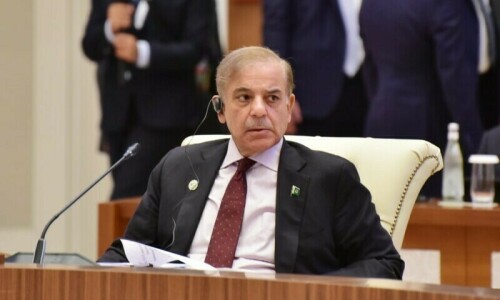HYDERABAD, Feb 7: Final year students of the Centre of Excellence in Arts and Design put on display in their art works varying shades of individual’s and society’s moods, manifestations of human psychology, social issues and world issues at an exhibition at the centre on Saturday.
The exhibition of art works and textile designs is a compulsory and last requirement for the students to accomplish their degrees. It will continue till Monday.
The student’s works were inspired by different concepts about life, social issues, child labour, drug addiction, impact of western culture on local population, AIDS and plight of Muslims worldwide.
Humera Khan’s theme was computer’s circuit board which she had transferred onto fabric through hand painting using different colours.
“We have to choose one window from our research board which is then composed and all the colour designs of the window are printed on the fabric,” she said.
Nimra Awan put her own life in front of her before going for the thesis, throwing light on her expressions, ideas, concepts, lifestyle and mood at different stages of her life from childhood to adulthood.
In one of the layouts, she depicted herself in the lap of her mother while in another she appeared sad and indecisive about life in another work.
Sayeda Maryam went for musical visualisation as she thinks that every musical line that rises and falls on equaliser depicts a particular mood. “It’s in fact blending of lines with music,” she remarked.
Sana Ejaz used colours of metallic buttons in her product to give stylish look to fashion accessories like bags, belts, shoes, jewellery, etc.
Anwar Ali depicted social behaviour that showed itself through graffiti. He used these designs in the products like panels, cushions and table lamps.
Faiza Nasir touched teenagers’ moods and even considered her own image as teenager by using florescent and bright colours. Her products included home accessories.
Then there was Quratul Ain, who selected wrist watches, their dials, roman digits and machinery for her thesis and used them on home accessories, screen printing and embroidery.
Hisam Mirani tried to suggest through his work that addicts should not be separated from society because addiction was a bad thing while addict was a patient.
Misbah Saleem sought to prevail upon people through her thesis “don’t think cellular” which can be harmful at times. She tried to create awareness among people about avoiding using cell phones while driving or crossing roads.
Ghulam Rasool’s work focussed on child labour. He has shared his own experience which he faced while seeking education and tried to exhort those people, who could afford, to educate at least one child.
Uzma Jalalani highlighted impacts of globalisation and influence of western culture on Pakistani society, urging people to become ‘branded Pakistani’ and not become ‘western puppets’. Anwar Ali’s work focussed on a promoting Muslim heroes like Ameer Hamza or indigenous stories whereas Shahzad Rashdi depicted message of Shah Abdul Latif Bhittai in the “Voice of Sufi’ which was backed by visuals on Shah’s Tambooro, Raga, and devotees.













































Dear visitor, the comments section is undergoing an overhaul and will return soon.